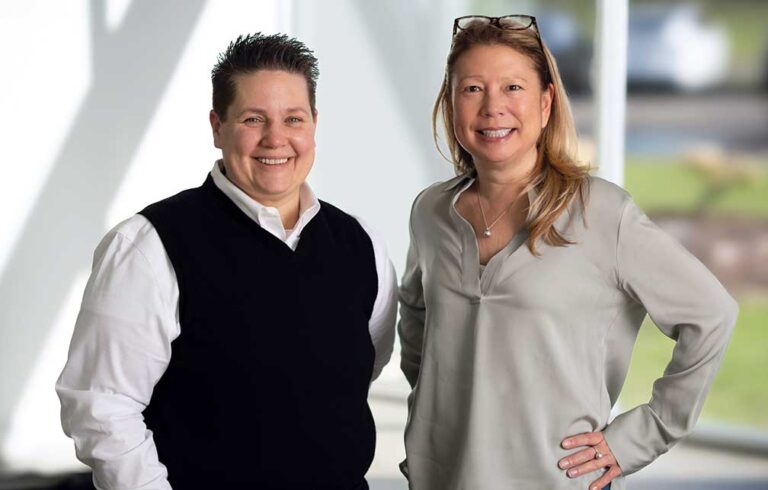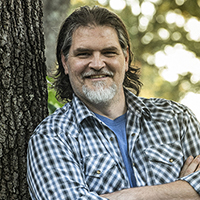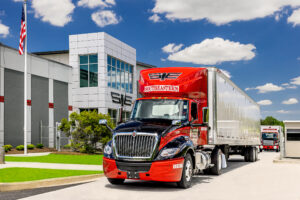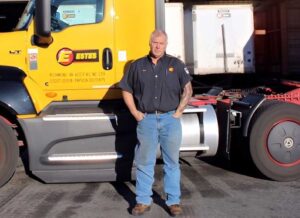In some ways, Erika Voss and Lisa Henshaw of DAT Freight and Analytics are as different as night and day.
In all the ways that matter most, however, both executives are cut from the same cloth. Both are innovative leaders who are attracting national attention in their respective fields of expertise as they work to keep data and people safe. In addition, both Voss and Henshaw are excelling in what is traditionally a man’s industry, reflecting changing perceptions throughout trucking.
Voss, who just this year became DAT’s vice president of information security, took a circuitous route to her role, beginning her professional life as a corrections officer before breaking into information technology, a field that’s almost as male-dominated as trucking.
Henshaw, a career human resources professional, has been a fixture at DAT since 1999. In her 25 years with DAT, she’s been a part of building the Portland, Oregon-based freight load board and data analytics agency into a leader in its field. She now serves as the firm’s vice president of human resources.
“I have to admit to being fairly fortunate to come into an industry where human resources was seen as a business partner from the very beginning,” said Henshaw. “Going back to when I started, I think the key thing that employees were looking for was stability more than anything else. That was something we were able to offer.
“DAT has been kind of a rock in this industry for a while, and I mean that in a good way,” Henshaw continued. “Employees wanted us to be clear as to what the expectations were, and then come to work and do a good job. It was fairly simple. Also, we were smaller, so we were able to operate more like a family, all in one building.”
If Henshaw represents the foundational elements of the company’s growth, Voss is absolutely a product of the digital age, working to foil hackers and other cyber threats on a daily basis. In so doing she finds herself singing familiar refrains when it comes to deflecting the assaults by the bad guys, even as it applies to future technologies.
“It doesn’t matter what company it is, and I don’t think it matters what vertical it is. At the end of the day, you’ve got to nail the basics,” Voss said. “You’ve got to have good cyber ‘hygiene.’ You’ve got to manage your passwords. You’ve got to have multifactor authentication on the apps you use. You’ve got to understand what actually happens when you click on a link.”
As an industry, Voss said, trucking stakeholders need to be better about educating drivers about cybersecurity, including the increasing role of artificial intelligence in various systems.
“Artificial Intelligence is the future, but it’s no different than any other emerging technology: You want to have ethical use and ensure things are done in a secure fashion,” Voss said. “But it’s also recognizing that for every good thing, there’s also a bad actor waiting to come and hack it and use it against you.
“You have to realize that phishing attacks are going to be harder, smarter, faster, more efficient,” she continued. “It’s really continuing that education, awareness and training journey that actually matters.”
Both Henshaw and Voss are working in their respective fields to make innovations in the industry.
One of Henshaw’s latest projects has been updating and recasting the company’s corporate culture into a codified set of values. While a lot of effort goes into identifying and writing the values, she says, this is actually the “easy” part of the process. The challenging part is consistently reinforcing those values until they become routine for the firm’s employees. This is accomplished by various means.
“(The word) ‘culture’ means different things to different people,” she explained. “These (values) are what help define DAT’s culture: Acting with integrity, executing with excellence, delivering customer value, innovating, and growing and together we thrive.”
Henshaw says DAT works to support its core values in a variety of ways.
“We have a Spot Award program, and those are made public. On an annual basis, at minimum, we call out those who have truly performed well and recognize them in a public online/in-person all-hands setting,” she said. “We also do quarterly reviews and the only questions that we really use to assess performance are the five core values.”
Similarly, Voss is working to leverage the company values to develop a new facet of corporate culture — one that solidifies IT security protocols as routine. Doing this is an imperative not only internally, she says, but also in interactions with external vendors and clients, who may not have such robust data security practices.
“If you look at the broker dynamic, they are more sophisticated because they have people who do network security, or they might have a security engineer or a director of information security,” Voss said. “If you think about the shippers and the carriers, many of these are one-off, mom-and-pop shops where the husband is driving the rig down the road and the wife is sitting at home at a kitchen table telling him where to go next.
“(If you just) put a smartphone in their hands and say, ‘Here’s multifactor authentication. Here’s a code. Here’s how you click a link,’ they don’t understand what that shit is — and they don’t want to,” she continued.
Therein lies the “million-dollar problem,” according to Voss.
“How do you reach those people and teach them good cyber hygiene and cyber best practices? That’s where we need to be better about teaching people password management and password health in general,” she explained.
A native of Washington state, Voss holds a doctoral degree in cybersecurity from Northcentral University in Arizona. She has previously worked for Fortune 500 companies Capital One, Salesforce and Microsoft. She was also recently recognized by Nasdaq as one of five women making cybersecurity history.
Henshaw earned a bachelor’s degree in applied mathematics from the University of California-San Diego, and she holds certificates in human resources management and compensation. She is a sought-after presenter for national conferences as well as a frequent guest on national podcasts on the topics of leadership and innovation in human resources.
Dwain Hebda is a freelance journalist, author, editor and storyteller in Little Rock, Arkansas. In addition to The Trucker, his work appears in more than 35 publications across multiple states each year. Hebda’s writing has been awarded by the Society of Professional Journalists and a Finalist in Best Of Arkansas rankings by AY Magazine. He is president of Ya!Mule Wordsmiths, which provides editorial services to publications and companies.














